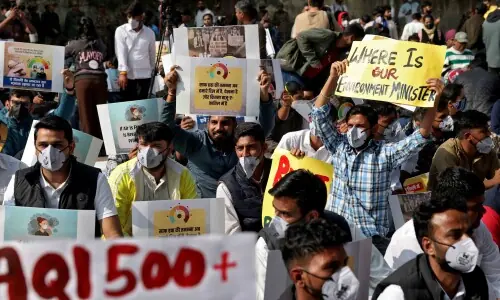NEW DELHI: India's Supreme Court commuted the sentences of 15 death row convicts on Tuesday, ruling that “inordinate and inexplicable” delays in their execution were grounds to change their sentences to life imprisonment.
Human rights lawyers hailed a decision which puts strict new conditions on carrying out the death penalty, and could dramatically reduce its use.
“Unexplained delay is a grounds for commuting death penalty to life sentence,” read a ruling from a three-judge panel headed by Chief Justice Palanisamy Sathasivam.
The court clarified that delays needed to be “inordinate” and “inexplicable”, but it also said that mental illness such as schizophrenia and the use of solitary confinement could make a convict eligible for a reduced sentence.
“No death row convict can be kept in solitary confinement and it is unconstitutional,” it said.
India has more than four hundred people on death row but has carried out only three executions in the last decade.
“This is a landmark judgement that will inch India closer to abolishing the death penalty altogether,” Asian Centre for Human Rights director Suhas Chakma told AFP.
India would probably continue to execute those prisoners convicted of crimes relating to national security, he said.
“But 90 per cent of the others have been convicted of murder and rape, and these people cannot all be executed,” he said.
Human rights lawyer Colin Gonsalves, founder of the Human Rights Law Network, told the CNN-IBN television network: “I can't tell you how overjoyed I am, how happy I am.”
Tuesday's ruling came in response to a petition from 15 death row convicts who challenged their sentences due to the time taken for the president to consider their mercy petitions.
They include four associates of India's slain “bandit king” Veerappan who were sentenced to death in 2004 for a deadly blast in southern India.
The ruling will probably also affect the high-profile case of Devinder Pal Singh Bhullar, a militant from the northwestern state of Punjab who was convicted over a New Delhi car bombing that killed nine people in 1993.
In April 2013 his appeal to the Supreme Court for clemency on the grounds of mental illness and delays was rejected.
Indian courts regularly hand down death sentences for the “rarest of rare” crimes but the country had an informal eight-year moratorium on executions until November 2012, when it put to death a gunman from the 2008 Mumbai attacks.
Another militant convicted for his role in an attack on the Indian parliament in 2001 was executed in February last year after his appeal for clemency was rejected by President Pranab Mukherjee.
Mukherjee, who took office in July 2012, has signalled a hard line on the death penalty by regularly dismissing mercy pleas — unlike his three predecessors.
The Supreme Court last made major headlines in December when it reinstated a colonial-era ban on homosexuality.
Finance Minister P. Chidambaram said that ruling took India “back in time to 1860” when the law against homosexuality was enacted by the British colonial-era adminstration.



































